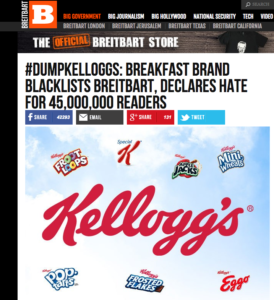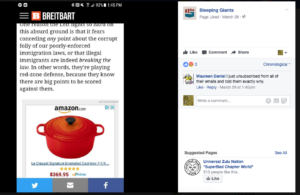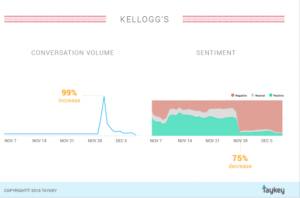In the last week of November 2016, breakfast food company Kellogg Co. decided to pull its ads from Breitbart.com after receiving complaints from customers about seeing Kellogg’s ads there (Hensch, 2016). Kellogg Co. spokeswoman Kris Charles said, “We regularly work with our media-buying partners to ensure our ads do not appear on sites that aren’t aligned with our company values” (Hensch, 2016).
It is not uncommon for companies that use programmatic advertising to buy large scale media placement packages and not necessarily know where all ads are placed (Giammona & Smith, 2016), but it is easy to filter certain websites, like porn sites, if they want to (Birkner, 2016). For Kellogg, Breitbart was an undesirable match for its line of breakfast cereals and other food products.
In her November 2016 “Buy the Way” blog post, “Kristin” explained how programmatic advertising works and the dilemma brands face in using them. I would like to continue the conversation she started by delving into the complicated challenges for brands when they do take an ethical stance regarding programmatic advertising, and are then vulnerable to calculated revenge.
Not long after its announcement, Kellogg Co.’s decision to ban ads from Breitbart was bolstered by the creation of an activist twitter and Facebook account called Sleeping Giants. The Sleeping Giants Facebook account says it is “dedicated to stopping racist, sexist, anti-Semitic and homophobic news sites by stopping their ad dollars. Because of ‘programmatic’ ad buying, many companies don’t even know they are appearing on these sites. We inform them and help them with advice on taking their ads down” (Sleeping Giants, 2017).
Sleeping Giants does this by posting and sharing screen shots of corporation ads on the Breitbart site to let the company and their customers know of the placement, and to broadcast social pressure so that companies are encouraged to make an ethical choice. Whether or not it was because of Sleeping Giants, by late year 2016 many other companies had also banned ads from Breitbart, including 3M, Patagonia, Zappos (Kennedy, 2017), Allstate, Nest, EarthLink, Warby Parker and SoFi (Giammona &Smith, 2016; Hensch, 2016). Above is a screen shot photo of an Amazon ad on Breitbart that was shared on Sleeping Giants’ Facebook page March 29, 2017.
Because Breitbart.com does not rely on subscriptions for revenue (Giammona & Smith, 2016), the news site recognized the very real damage this type of social activism, paired with corporate response, could have on its business model. The editors came out swinging.
Within days of Kellogg’s decision, Breitbart created the campaign #dumpkellogg, asking readers to boycott the brand (Walker, 2016) and stating the decision by Kellogg “represent[s] an escalation in the war by leftist companies like Target and Allstate against conservative customers whose values propelled Donald Trump into the White House” (Breitbart, 2016). Breitbart also characterized Kellogg’s decision as “bigoted and anti-American” (Breitbart, 2016) and published critical stories about the brand, such as “SHOCK: Amnesty International Blasts Kellogg’s for Using Child Labor-Produced Ingredients” (Kennedy, 2016). Breitbart readers could also sign a boycott-Kellogg petition, which had 400,000 signatures by December 9 (Walker, 2016).
In the ensuing weeks, Kellogg endured a social media outcry from Breitbart readers, and the boycott caused Kellogg’s social media sentiment to plummet 75 percent, according to audience data company Taykey (Birkner, 2016). But Kellogg also received accolades in the news media and some consumers vowed to make all-Kellogg donations to soup kitchens (Kennedy, 2017).
The question this story illuminates is whether or not Kellogg Co. would or should make the same decision again, if given a do-over. Does the resulting social media crisis matter, if the company is well aligned with brand identity? To what extent do ethical choices need to also serve the insatiable drive for profit and shareholder value? What do you think?
I believe it is crucial for companies to be loyal to the brand identity, even if it means sustaining a negative backlash. Doing the right thing for the brand is paramount. The Kellogg Co. example illustrates that even when companies make the right ethical choice for the brand, they must also brace for the fierce backlash of opponents.
References
Birkner, C. (2016, Dec. 12). How New Balance, Pepsi and Kellogg’s were impacted by Trump controversies. Adweek. Retrieved from http://www.adweek.com/brand-marketing/how-new-balance-pepsi-and-kelloggs-were-impacted-trump-controversies-175072/
Breitbart News. (2016, Nov. 30). #DumpKelloggs: Breakfast brand blacklists Breitbart, declares hate for 45,000,000 readers. Breitbart. Retreived from http://www.breitbart.com/big-government/2016/11/30/dumpkelloggs-kelloggs-declares-hate-45-million-americans-blacklisting-breitbart/
Giammona, C., & Smith, G. (2016, Nov. 29). Kellogg pulls ads from Breitbart amid hate-speech concerns. Bloomberg. Retrieved from https://www.bloomberg.com/news/articles/2016-11-29/kellogg-pulls-ads-from-breitbart-amid-concerns-about-hate-speech
Hensch, M. (2016, Nov. 29). Kellogg yanks ads from Breitbart. The Hill. Retrieved from http://thehill.com/homenews/news/307970-kellogg-yanks-ads-from-breitbart
Kennedy, P. (2017, Jan. 7). How to destroy the business model of Breitbart and fake news. The New York Times. Retrieved from https://mobile.nytimes.com/2017/01/07/opinion/sunday/how-to-destroy-the-business-model-of-breitbart-and-fake-news.html?_r=0&referer=http://m.facebook.com
Sleeping Giants. (n.d.). About Us [Facebook page]. Retrieved May 27, 2017, from https://www.facebook.com/pg/slpnggiants/about/?ref=page_internal
Walker, R. (2016, Dec. 9). Breitbart treats Kellogg to its smash-mouth style. The New Yorker. Retrieved from http://www.newyorker.com/business/currency/breitbart-treats-kellogg-to-its-smash-mouth-style




2 Responses to The Hard Choice: Ethical Marketing Can Cause a PR Nightmare